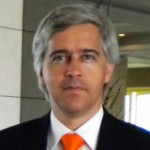 I carefully noted the last two public tirades by those responsible for our sector, namely at the DN MAR Conference, in Lagos, and at the Millennium BCP Journeys, in Lisbon.
I carefully noted the last two public tirades by those responsible for our sector, namely at the DN MAR Conference, in Lagos, and at the Millennium BCP Journeys, in Lisbon.
Either our industry started yesterday (and I've been distracted) or talking about commonplaces has become fashionable.
Always more of the same: dependence on sun and sea and seasonality kill us, we have to diversify, we have to bet on new niches, we need a new strategy, we need to invest more in promotion.
In addition, we now have a novelty, which has been repeated by the Secretary of State for Tourism (SET): that Tourism is not in crisis, as both the number of tourists and the average expenditure per tourist have grown, the that has not grown are the profits of the hotel industry.
On my side, here it goes:
The dependence on Sun and Sea is great, as more than half of the world's demand is based there … without them, we wouldn't even be a tourist country.
The Sun and Sea has to be as or more cherished than all the new niches, as it is the anchor of most of them, it has to be continually updated, valued, intensified. If it's bigger, it produces more return. Any 2% growth in this segment induces much more value than, say, doubling birdwatching or cycling tourism.
In addition, a large part of the existing offer was made for him and this investment must continue to be remunerated and cannot be forgotten. We have to focus on the big segments and compete in them.
Diversifying into under-production times, like the current one, is a shot in the foot. It is the capacity already installed that has to be monetized and not what we would like to have or have had.
There is no strategy that produces good results if the vision on which it is based is the wrong one. We go from strategic plan to strategic plan, when the problem is in the vision of what we want, can or must have.
Strategy only comes after that and to satisfy that vision. If there is no vision, the strategy only serves to deceive, confusing its existence or not with the resolution or not of real problems.
With regard to seasonality, the demand curve in Portuguese tourist destinations is the same as the world demand curve, so seasonality is not eradicable. The central issue is therefore to know how to mitigate it, but on two fronts: the number of tourists and the average expenditure. I have only seen concern with the first one and the results are nil.
As for the promotion, the funds will always be insufficient, so the focus it must be in arranging more and greater sources of contribution to the cake.
If the sector is organized in cluster, sectors that benefit from tourism may also contribute (banking, distribution, telecommunications). It's the targeting this communication has to be increasingly effective… for the same euros spent, achieving incremental returns.
We are not in crisis, according to the statistics, says SET. The point is that official statistics do not measure competitors and do not measure returns, they measure sales (tourist spending).
Now, from a ruler, what I would expect was that, at least, he would bring to the sector adequate metrics and that he would be guided by them.
The industry is well aware that rising sales does not equate to rising profits. And you know even better that, regardless of the sales growth rate, there are sales levels that do not generate the necessary return to remunerate the formation of fixed capital (investment) in the meantime constituted to generate these sales.
So, SET should know that the problem is not just in the hotel business... that's where it sees them best, because within the tourism value chain, hotels are still the portion that has some scale and whose investments and leverage are of greater relief.
But, even so, does the restoration look good to you? And aviation? Have you noticed improvements in TAP's balance sheet? Do golf course owners seem comfortable with the investments they've made? And the bank, are you comfortable with the risk you took or helped to take? And the number of travel agents closing is a symptom of what? What about real estate (another sub-sector cursed by public opinion, but which underpins much of the value in Western economies)? And tourism has grown as a % of GDP, even with GDP decreasing?
I even think that SET has been thinking in the right direction, more liberalizing, more accountable and integrating the private sector, with an effort to make commitments and fulfill deadlines.
The point is that either you really see which problems have to be solved right and mobilize forces and resources to solve them, or else we are always solving the wrong problems.
Therefore, the problem has long ceased to be strategic, financial or operational. We really have to go to the ophthalmologist.
Author Mário Candeias is a Hotel Manager and starts signing, as of today, a regular column on Tourism in the Sul Informação.


















Comments